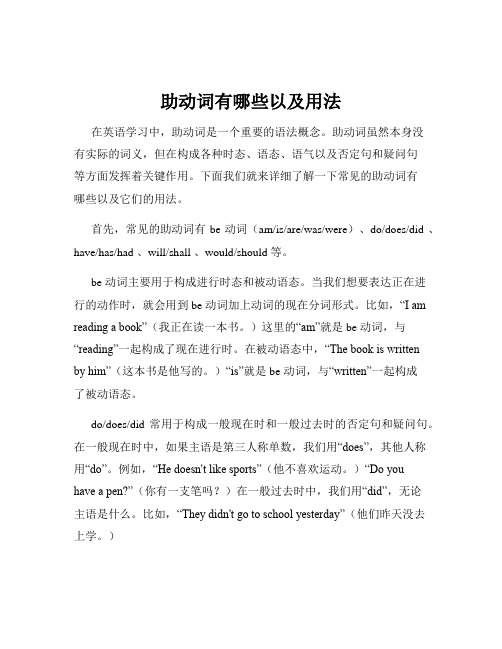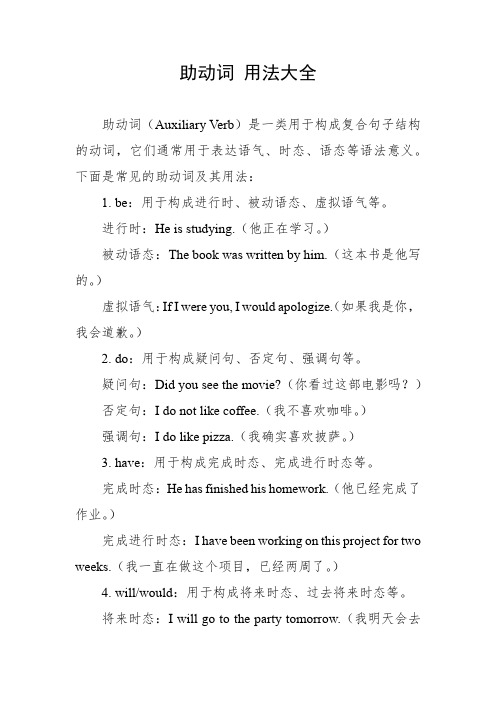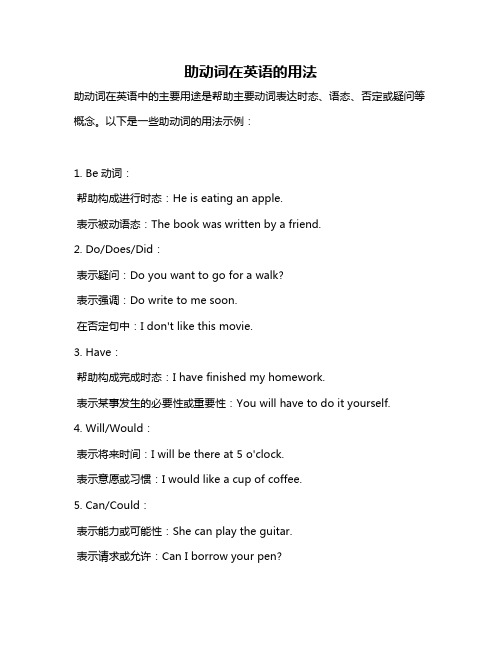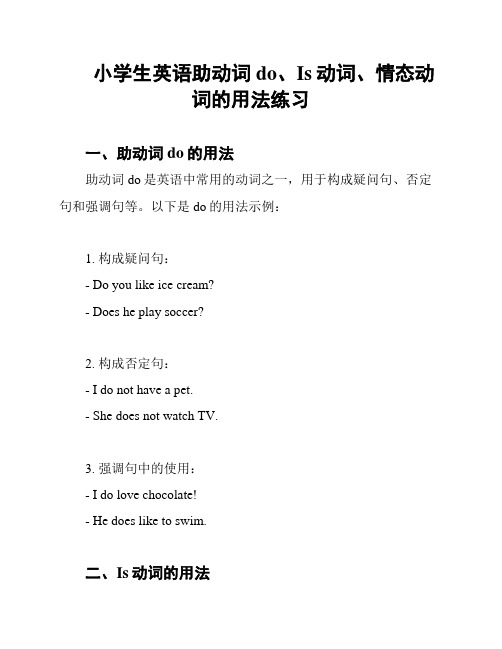小学英语助动词用法归纳
助动词有哪些以及用法

助动词有哪些以及用法在英语学习中,助动词是一个重要的语法概念。
助动词虽然本身没有实际的词义,但在构成各种时态、语态、语气以及否定句和疑问句等方面发挥着关键作用。
下面我们就来详细了解一下常见的助动词有哪些以及它们的用法。
首先,常见的助动词有 be 动词(am/is/are/was/were)、do/does/did 、have/has/had 、will/shall 、would/should 等。
be 动词主要用于构成进行时态和被动语态。
当我们想要表达正在进行的动作时,就会用到 be 动词加上动词的现在分词形式。
比如,“I am reading a book”(我正在读一本书。
)这里的“am”就是 be 动词,与“reading”一起构成了现在进行时。
在被动语态中,“The book is writtenby him”(这本书是他写的。
)“is”就是 be 动词,与“written”一起构成了被动语态。
do/does/did 常用于构成一般现在时和一般过去时的否定句和疑问句。
在一般现在时中,如果主语是第三人称单数,我们用“does”,其他人称用“do”。
例如,“He doesn't like sports”(他不喜欢运动。
)“Do youhave a pen?”(你有一支笔吗?)在一般过去时中,我们用“did”,无论主语是什么。
比如,“They didn't go to school yesterday”(他们昨天没去上学。
)have/has/had 主要用于构成完成时态。
“have/has”用于现在完成时,“had”用于过去完成时。
现在完成时表示过去发生的动作对现在造成的影响或结果,或者过去开始的动作一直持续到现在。
例如,“I have finished my homework”(我已经完成了作业。
)过去完成时则表示过去某个时间之前已经完成的动作。
“By the time I got there, they had left”(我到那儿的时候,他们已经离开了。
助动词英语语法知识点与语法填空必背的短语

助动词英语语法知识点与语法填空必背的短语过去将来完成时(past future perfect tense)表示在过去将来某一时间以前已经完成的动作。
它的形式由 should(第一人称)或 Would(第二、三人称)加have 再加过去分词构成。
美国英语一律用Would。
小编在这里整理了相关资料,希望能帮助到您。
助动词的形式与作用1)英语常用的助动词(auxiliary verb)有 shall,will,should,would,be,have,do 等。
助动词一般无词义,不能单独作谓语动词。
助动词在句中的作用,在于帮助构成各种时态、语态、语气、否定和疑问结构等。
如:China has entered a great new era. 中国已进入了一个伟大的新时期。
(帮助构成完成时态)Some boys are playing on the grass. 一些男孩正在草地上玩。
(帮助构成进行时态)Mother is written by Gorky. 《母亲》是高尔基写的。
(帮助构成被动语态)We Shall have the football match if it does not rain.如果不下雨,我们就赛足球。
(帮助构成将来时态和否定结构)Do you see my point? 你明白我的意思吗?(帮助构成疑问结构)[注]在否定结构中,not 须放在助动词后面。
2)助动词加not 一般都有简略式,用于口语中。
如:is not-isn't would not--wouldn'tare not--aren't [B:nt] have not--haven'twas not -- wasn't has not--hasn'twere not-- weren't [wE:nt] had not--hadn'tshall not--shan't [FB:nt] do not--don't [dEunt]will not--won't [wEunt] does not--doesn'tshould not--shouldn't did not--didn'tbe助动词be 的形式变化和动词be。
助动词 用法大全

助动词用法大全助动词(Auxiliary Verb)是一类用于构成复合句子结构的动词,它们通常用于表达语气、时态、语态等语法意义。
下面是常见的助动词及其用法:1. be:用于构成进行时、被动语态、虚拟语气等。
进行时:He is studying.(他正在学习。
)被动语态:The book was written by him.(这本书是他写的。
)虚拟语气:If I were you, I would apologize.(如果我是你,我会道歉。
)2. do:用于构成疑问句、否定句、强调句等。
疑问句:Did you see the movie?(你看过这部电影吗?)否定句:I do not like coffee.(我不喜欢咖啡。
)强调句:I do like pizza.(我确实喜欢披萨。
)3. have:用于构成完成时态、完成进行时态等。
完成时态:He has finished his homework.(他已经完成了作业。
)完成进行时态:I have been working on this project for two weeks.(我一直在做这个项目,已经两周了。
)4. will/would:用于构成将来时态、过去将来时态等。
将来时态:I will go to the party tomorrow.(我明天会去参加聚会。
)过去将来时态:I would have gone to the party if I had been invited.(如果我被邀请,我本来会去参加聚会的。
)5. can/could:用于构成能力、请求、猜测等。
能力:I can swim.(我会游泳。
)请求:Could you help me with this?(你能帮我这个吗?)猜测:She might be coming late.(她可能会来晚。
)6. should/would:用于构成建议、假设等。
建议:You should take a break.(你应该休息一下。
助动词在英语的用法

助动词在英语的用法助动词在英语中的主要用途是帮助主要动词表达时态、语态、否定或疑问等概念。
以下是一些助动词的用法示例:1. Be动词:帮助构成进行时态:He is eating an apple.表示被动语态:The book was written by a friend.2. Do/Does/Did:表示疑问:Do you want to go for a walk?表示强调:Do write to me soon.在否定句中:I don't like this movie.3. Have:帮助构成完成时态:I have finished my homework.表示某事发生的必要性或重要性:You will have to do it yourself.4. Will/Would:表示将来时间:I will be there at 5 o'clock.表示意愿或习惯:I would like a cup of coffee.5. Can/Could:表示能力或可能性:She can play the guitar.表示请求或允许:Can I borrow your pen?6. May/Might:表示可能性或允许:It might rain later.表示请求或询问:May I use your phone?7. Must/Mustn:表示必须或必要:You must finish your homework.表示推测:He must be at home now.8. Ought to:表示应该或责任:You ought to help others when they are in trouble.9. Shall/Should/Would (较为少用,现在已逐渐被助动词"should"替代):在某些疑问句中表示建议或提议:What shall we do this weekend? 10. 助动词的否定形式:通常在助动词后面加上“not”来表示否定,例如“I don't know”表示“我不知道”。
英语助动词用法口诀

英语助动词用法口诀英语学习中,助动词是一个重要的语法点。
掌握助动词的用法对于正确表达句子的时态、语态和语气至关重要。
为了帮助大家更好地理解和运用助动词,下面给大家分享一个助动词用法口诀。
“be do have,三大助动要清楚。
be 有 am is are,用法不同要记住。
I 用 am,you 用 are,is 连着他她它。
单数名词用 is,复数名词全用 are。
变疑问,往前提,句末问号莫丢弃。
变否定,更容易,be 后 not 别忘记。
do 来帮忙,行为动词有搭档。
一般现在时用 do,三单形式用 does。
否定 don't 和 doesn't,放在动词原形前。
疑问 Do 和 Does 先,动词原形跟后面。
have has 表拥有,现在完成时态见。
主语单三用 has,其他人称用 have。
过去分词一起伴,构成完成时态链。
will would 表意愿,将来过去细分辨。
shall 只用于第一人称,其他都用 will 连。
would 是 will 的过去,语气委婉更和善。
can could 表能力,许可可能也能管。
could 是 can 的过去,语气更加委婉点。
may might 表许可,might 语气更委婉。
must 表必须很坚决,否定回答 needn't 换。
助动词,作用大,时态语气它当家。
多练习,多运用,英语表达顶呱呱。
”接下来,咱们详细地说一说这个口诀里的各个要点。
先看“be 有am is are”这部分。
“I 用 am,you 用 are,is 连着他她它”,这是最基础也是最常见的用法。
比如,“I am a student”(我是一名学生。
)“You are my friend”(你是我的朋友。
)“He is a teacher”(他是一位老师。
)当遇到单数名词时,像“ The book is on the desk”(这本书在桌子上。
)复数名词时,例如“These books are on the desk”(这些书在桌子上。
小学生英语助动词do、Is动词、情态动词的用法练习

小学生英语助动词do、Is动词、情态动词的用法练习一、助动词do的用法助动词do是英语中常用的动词之一,用于构成疑问句、否定句和强调句等。
以下是do的用法示例:1. 构成疑问句:- Do you like ice cream?- Does he play soccer?2. 构成否定句:- I do not have a pet.- She does not watch TV.3. 强调句中的使用:- I do love chocolate!- He does like to swim.二、Is动词的用法Is动词是be动词的第三人称单数形式,常用于描述第三人称单数的状态和特征。
下面是is的用法示例:1. 描述第三人称单数的状态和特征:- She is a doctor.- He is tall and handsome.2. 表示存在:- There is a book on the table.- There is a cat in the garden.三、情态动词的用法情态动词(Modal Verbs)在英语中表达情态、推测、可能性、许可和能力等意义。
常见的情态动词包括can、could、may、might、shall、should、will、would、must等。
以下是情态动词的用法示例:1. 表示能力与许可:- Can I go to the restroom?- You must finish your homework.2. 表示推测和可能性:- It may rain tomorrow.- They might arrive late.3. 表示建议和义务:- You should eat more vegetables.- We must be on time for the meeting.请根据上述用法示例,完成下面的练题。
练题:根据句意,选择适当的助动词do、Is动词或情态动词填空。
有关什么是助动词的小学英语动词语法运用.doc

有关什么是助动词的小学英语动词语法运用英语不仅出现在课堂里,它已经融入到了整个社会中,成为人类生活中不可缺少的一部分,特此为大家整理了有关什么是助动词的小学英语动词语法运用,敬请同学们关注!!
1)协助主要动词构成谓语动词词组的词叫助动词(Auxiliary Verb)。
被协助的动词称作主要动词(Main Verb)。
助动词自身没有词义,不可单独使用,例如:
He doesn’t like English.他不喜欢英语。
(doesn’t是助动词,无词义;like是主要动词,有词义)
2) 助动词协助主要动词完成以下功用,可以用来:
a. 表示时态,例如:
He is singing.他在唱歌。
He has got married.他已结婚。
b. 表示语态,例如:
He was sent to England.他被派往英国。
c. 构成疑问句,例如:
Do you like college life?你喜欢大学生活吗?
Did you study English before you came here?你来这儿之前学过英语吗?
d. 与否定副词not合用,构成否定句,例如:
I don’t like him.我不喜欢他。
e. 加强语气,例如:
Do come to the party tomorrow evening. 明天晚上一定来参加晚会。
He did know that.他的确知道那件事。
3) 最常用的助动词有:be, have, do, shall, will, should, would
由为您提供的有关什么是助动词的小学英语动词语法运用,希望给您的英语带来帮助!。
助动词知识点总结

助动词知识点总结助动词(auxiliary verb)是指在构成谓语时,与实义动词连用构成谓语的一类动词。
助动词可以帮助说明动作的进行、完成、可能性、必然性等情况。
在英语语法中,助动词是非常重要的一部分,它们在句子中起着关键的作用,帮助我们表达时间、方式、情态等内容。
因此,理解和掌握助动词的使用是学习英语语法的重要一环。
一、助动词的分类1. Be 动词:am, is, are, was, were, being, beenBe 动词主要用于表示主语状态、性质、特征的变化,以及主语动作、行为的时间、地点、原因、结果等情况,具有相对固定的搭配。
例如:He is running.他正在跑步。
2. Do 动词:do, does, didDo 动词用于构成一般现在时、一般过去时以及疑问句和否定句。
例如:She does her homework every day.她每天做作业。
3. Have 动词:have, has, hadHave 动词用于构成现在完成时、过去完成时等时态,也可表示某种关系或存在的状态。
例如:I have finished my work.我已经完成了工作。
4. 情态动词:can, could, may, might, must, shall, should, will, would情态动词通常用于表示可能性、必要性、愿望等情态。
它们具有一定的情态义,因此在句子中的位置和用法也有特殊的规则。
例如:You should study harder.你应该更努力地学习。
二、助动词的功能1. 构成时态:助动词与实义动词的搭配可以构成各种时态,包括一般现在时、一般过去时、现在进行时、过去进行时、现在完成时、过去完成时等。
助动词的不同搭配可以帮助我们表达不同的时间情况。
2. 构成疑问句和否定句:除了帮助构成时态外,助动词还可以帮助构成疑问句和否定句。
在构成疑问句时,助动词通常位于句首,并与实义动词调换位置;在构成否定句时,助动词通常与 not 搭配构成否定形式。
- 1、下载文档前请自行甄别文档内容的完整性,平台不提供额外的编辑、内容补充、找答案等附加服务。
- 2、"仅部分预览"的文档,不可在线预览部分如存在完整性等问题,可反馈申请退款(可完整预览的文档不适用该条件!)。
- 3、如文档侵犯您的权益,请联系客服反馈,我们会尽快为您处理(人工客服工作时间:9:00-18:30)。
助动词(Auxiliary Verb):协助主要动词构成谓语动词词组的词。
自身没有词义,不可单独使用。
主要动词(Main Verb):是被协助的动词,构成时态和语态。
He doesn't like English. 他不喜欢英语。
(doesn't是助动词,无词义;like是主要动词,有词义)最常用的助动词有:be, have, do, shall, will, should, would 等。
基本助动词只有三个:be, do, have他们没有词汇意义,只有语法作用,如协助构成进行时,完成时,被动态,否定句,疑问句等。
一、be 动词的用法既可作系动词,又可作助动词,做助动词有人称和数的变化,第一人称用am,第二人称及复数用are,第三人称及单数用is,am,is 过去式为was, are的过去式为were,它与现在分词构成进行时态和过去分词一起构成被动语态。
a. 表示时态be+doing(现在分词)表示现在进行的动作He is singing. 他正在唱歌。
b. 表示语态be+done(过去分词)表被动语态He was sent to England. 他被派往英国。
c. be+to do(动词不定式)表示计划安排命令。
We are to plant trees next week. 下周我们将要去植树。
You are to explain this 。
对此你要做出解释。
二、do的用法Do主要帮助实意动词构成否定和疑问句,后跟动词原形,有时放在实意动词前起强调作用,还可代替前文出现的动词,避免重复。
Do 有人称和数的变化,第一、二人称及复数用do,第三人称及单数用does,过去式为did。
1)构成一般疑问句。
DO +主语+动词原形+其他I like singing 变为疑问句为Do you like singing ?2)do + not 构成否定句。
主语+do +not +动词原形。
I do not want to be criticized.我不想挨批评。
He doesn't like to study.他不想学习。
Many students didn’t know the importance of English before. 过去好多学生不知道英语的重要性.3) 构成否定祈使句。
Don't go there.不要去那里。
Don't be so absent-minded.不要这么心不在焉。
说明:构成否定祈使句只用do,不用did和does。
4)放在动词原形前,加强该动词的语气。
Do come to my birthday party please.请一定来参加我的生日宴会。
I did go there.我确实去那儿了。
I do miss you.我确实想你。
我真想你了!5)用作代替动词。
---- Do you like Beijing? --你喜欢北京吗?---- Yes, I do.No,I don’t. --是的,喜欢。
(do用作代动词,代替like Beijing.)He knows how to drive a car, doesn't he? 他知道如何开车,对吧?三、have 的用法Have+过去分词构成完成时态I have studied english for a long time .情态动词的基本用法归纳情态动词有can (could), may (might), must, have to, shall (should, will (would), dare (dared), need (needed), ought to等。
情态动词无人称和数的变化;不能单独使用,必须与其后的动词原形构成谓语。
一、can, could1) 表示能力Mary can speak three languages.Can you skate?此时可用be able to代替。
Can只有一般现在时和一般过去式;而be able to则有更多的时态。
I’ll not be able to come this afternoon.当表示“经过努力才得以做成功某事”时应用be able to,不能用Can。
如:He was able to go to the party yesterday evening in spite of the heavy rain.2) 表示请求和允许。
-----Can I go now?----- Yes, you can. / No, you can’t.此时可与may互换。
在疑问句中还可用could,might代替,不是过去式,只是语气更委婉,不能用于肯定句和答语中。
---- Could I come to see you tomorrow?---- Yes, you can. ( No, I’m afraid not. )3) 表示推测(惊讶、怀疑、不相信的态度),用于疑问句、否定句和感叹句中。
Can this be true?This can’t be done by him.How can this be true?二、may, might1) 表示请求和允许。
might比may语气更委婉,而不是过去式。
否定回答时可用can’t或mustn’t,表示“不可以,禁止”。
----Might/ May I smoke in this room?---- No, you mustn’t.---- May/Might I take this book out of the room?---- Yes, you can. (No, you can’t / mustn’t. )用May I...?征徇对方许可时比较正式和客气,而用Can I...?在口语中更常见。
2)用于祈使句,表示祝愿。
May you succeed!3) 表示推测、可能性(不用于疑问句)。
might不是过去式,它所表示的可能性比may小。
1.He may /might be very busy now.2.Your mother may /might not know the truth.三、must, have to1) 表示必须、必要。
You must come in time.在回答引出的问句时,如果是否定的,不能用mustn’t(禁止,不准),而用needn’t, don’t have to(不必).---- Must we hand in our exercise books today?---- Yes, you must.---- No, you don’t have to / you needn’t.2) must是说话人的主观看法,而have to则强调客观需要。
Must 只有一般现在时,have to 有更多的时态形式。
1.he play isn’t interesting, I really must go now.2.I had to work when I was your age.3) 表示推测、可能性(只用于肯定的陈述句)1.You’re Tom’s good friend, so you must know what he likes best.2.Your mother must be waiting for you now.四、shall, should1)shall +动词原形表示将来时态Shall we go shopping tomorrow?2) shall 用于第一人称,征求对方的意见。
What shall we do this evening?shall 用于第二、三人称,表示说话人给对方的命令、警告、允诺或威胁。
1. You shall fail if you don’t work hard.(警告)2. He shall have the book when I finish it.(允诺)3. He shall be punished.(威胁)六、will, would1) 表示请求、建议等,would更委婉。
Would you like a cup of coffee? 你想要一杯咖啡吗?2)will +动词原形表将来时态He will come back next month . 他下个月将会回来。
3)表示意志、愿望和决心。
1. I will never do that again.助动词练习题1 把下列句子变为一般疑问句。
1.It is a lovely dog.________________________________________ 2.She is lovely girl.________________________________________ 3.We are classmates.______________________________________4.I am a doctor.________________________________________ 5.There is a bird in the tree.________________________________6.They are good friends.____________________________________7.I love my parents._______________________________________ 9. We have a pleasant home._______________________________10.They go to church on Sunday._____________________________11.You are a singer.______________________________2. 用do does be 填空1> _____ she know all the answers ?Yes , she ____ . No, she _____.2> _____ the twins often fight ?Yes ,_____ do. No, _____ don’t.3> _____ your dad like listening to music?Yes ,____ does . No, _____ doesn’t.5> _____ you have a new teacher?Yes , I ______. No, I ______.6> _____ she a teacher?Yes, she _____ . No, she _____.10> _____ your father smoking in the living room?Yes, ____ is .No, he _____.助动词和情态动词专项练习一、情态动词的基本用法⒈Can John Smith ______ his homework on time?A. finishB. finishesC. finishingD. finished⒉She dare ______ out by herself at night.A. go notB. not to goC. to not goD. not go⒊You ______ to the party tonight if you have something important to do.A. don’t need comeB. needn’t to comeC. needn’t comeD. don’t need coming⒋—We’ll be ready to leave at eight.—Well, John must ______ back by then.A. beingB. isC. beD. to be⒌Your grandmother ______ the newspaper without glasses.A. can still readB. cans still readC. still can readsD. can still reads二、must, need, dare的用法⒍—Must I get up early tomorrow, Dad?—No, you _____. Tomorrow is Sunday.A. can’tB. mustn’tC. needn’tD. couldn’t⒎—Must we finish the book today?—Yes, you ______.A. canB. mayC. needD. must⒏You ______ play on the road. It’s dangerous.A. mustn’tB. mayC. canD. must⒐You ______ return the book now. You can keep it until next week.A. can’tB. mustn’tC. needn’tD. dare not⒑I ______ a sleeping bag because I’ve already got one.A. needn’t haveB. didn’t haveC. don’t needD. need not⒒Mr Smith ______ a pen from Jack.A. must to borrowB. had borrowedC. must borrowedD. had to borrow三、can, could, may, might的用法⒓The man ____ walk fast because he is lame in the right foot.A. mustB. mustn’tC. canD. can’t⒔—Could I borrow your dictionary?—Yes, of course you ______.A. willB. wouldC. mustD. can⒕A computer _____ think for itself, it must be told what to do. A. might not B. may not C. couldn’t D. can’t⒖—That must be a mistake.—I don’t think so. It ______ a mistake.A. may be notB. needn’t beC. cannot be⒗He ______ help crying at the news of his father’s death.A. couldn’tB. shouldn’tC. hadn’tD. didn’t⒘“Now, ______ all smile, please?” he asked.A. may youB. do youC. shall youD. can you⒙I haven’t brought my dictionary with me. _____ I use yours?A. MustB. ShallC. MayD. Need四、should, would, shall, will的用法⒚—Must I copy the new words in class?—No, you ______. You ______ do it at home.A. needn’t, mayB. mustn’t, mustC. mustn’t, mayD. needn’t, mustn’t⒛—Would you please not draw pictures on the wall?—Sorry. I ______ it again.A. am not doingB. don’t doC. didn’t doD. won’t do21.______ I open the window? It’s so warm here.A. ShallB. WillC. WouldD. Must22.______ you like some oranges?A. WouldB. CanC. MayD. Must23.Tom said that he ______ apologize to Mary.A. wouldB. willC. shallD. is going to24.“Do you think we ______ turn back?” Jane asked.A. shallB. willC. shouldD. would⒈He ______ any help. He can do it all by himself.A. needs notB. needn’tC. doesn’t needD. doesn’t need to ask⒉Li Fang isn’t in the classroom. He ______ be at the library. Let’s go and find him.A. canB. mustC. needD. should⒊—May I have a look at your new watch ?—Yes, you ______.A. canB. mustC. needD. should⒋—Must I hand in the exercise book tomorrow ?—No, you______. You can hand it in the day after tomorrow.A. can’ tB. mustn’tC. needn’tD. couldn’t⒌There ______ an English test next Monday.A. maybeB. wasC. may beD. may⒍You’d better ask someone, or you______ get lost.A. mayB. mustn’tC. are going toD. can7.“Come on!” Peter called. “We ______ stay here any longer.”A. couldn’tB. can’tC. hadn’t toD. mightn’t8..Must Tom write it now? No, he ______.A. needn’tB. can’tC. mustD. mustn’t9.“Have you seen Li recently?”“No, I think he must ______ away on vacation.”A. beingB. isC. beD. to be10.“All right. You ______ if you don’t want to.”A. don’t need stayB. needn’t stayC. needn’t to stayD. don’t need staying 1:She ________ to see documentaries(记录片).A、do wantB、don't wantC、doesn't wantD、not want2:Look at that picture on the wall. __________ you like it?A、DoB、CanC、CouldD、Are3:He ________ like pears.A、doB、isC、doesn'tD、not4:—Do you often go to the cinema______ Sunday?—No, we__________.A、on, don'tB、on, aren'tC、in, doD、in, don't5:-Can you see a light on the table?-Yes, ________.A、I amB、I’m notC、I canD、He isn’t6:—Does the boy want to be an actor? —________.A、Yes, he isB、No, he doesC、Yes, he doesD、No, he isn't7:_________ he have any apples ?A、DoB、DoesC、IsD、Are8:She ______ want to be a policewoman, because she thinks it’s kind of dangerous.A、isn’tB、aren’tC、don’tD、doesn’t9:Why____he have brown hair?A、doB、doesC、isD、has10:What time__________ he get home every day?A、isB、doesC、doD、am11:What________ you see in the picture?A、isB、areC、canD、have12:Jack_______ like flying kites______ throwing a frisby.A、don't, orB、doesn't, andC、don't, andD、doesn't, or13:A:________ Jim ________ a ball?B:No, he________.A、Do, have, don'tB、Does, has, doesn'tC、Is, have, isn'tD、Does, have, doesn't14:I ________ have a watch.A、am notB、doesC、don'tD、doesn't15:____you____a good time on your vacation?A、Did; haveB、Did; hadC、Were; haveD、Were; had16:Simon likes _____ football, but he doesn’t _____ it well.A、play, playsB、to play, playsC、plays, playingD、playing, play 17:She____have to wash the dishes now.A、don'tB、notC、doesn'tD、can't18:—________Colin ________ Chinese history? —Yes, he does.A、Do; likeB、Does; likesC、Do; likesD、Does; like19:Li Lei ______ lunch at home.A、hasn’tB、haven’tC、don’t haveD、doesn’t have20:-Who cleaned the blackboard yesterday, Dick? -John___.A、cleanedB、doesC、didD、is21:__________ you usually come to school by bike?A、Don'tB、Doesn'tC、Aren'tD、Isn't22:-Where______lions come from? -I think they come from Africa.A、areB、isC、doesD、do23:__________ we have any eggs?A、Aren'tB、Don'tC、Can'tD、Mustn't24:____you on your vacation yesterday?A、AreB、WereC、WasD、Did25:-Who____dinner last night? -My mother____.A、cooked; didB、did; cookedC、did; didD、cooked; cooked1.There __________ a meeting tomorrow afternoon.A. will be going toB. will going to beC. is going to beD. will go to be2.Mother ________ me a nice present on my next birthday.A. will givesB. will giveC. givesD. Give3.Listen! The girl _____________ in the room.A. singsB. singingC. is singingD. are singing4.What are you doing? I’m __________ TV.A. watchB. watchesC. to watchD. Watching5.In our school there are fifty-five ___.A women teachers B. woman teachers. C women teacher D. woman’s teacher6.Jack went to have two ___ pulled out yesterday afternoon.A. toothsB. toothC. teethD. Toothes7.Many ____ have been built in our city since 1987.A. factorysB. factoriesC. factoryesD. factorys8.Who's that at the door? ____ is the postman.A. SheB. ThisC. ItD. He9. you go to the movies yesterday?A.DoB.DidC..DoesD.Have。
